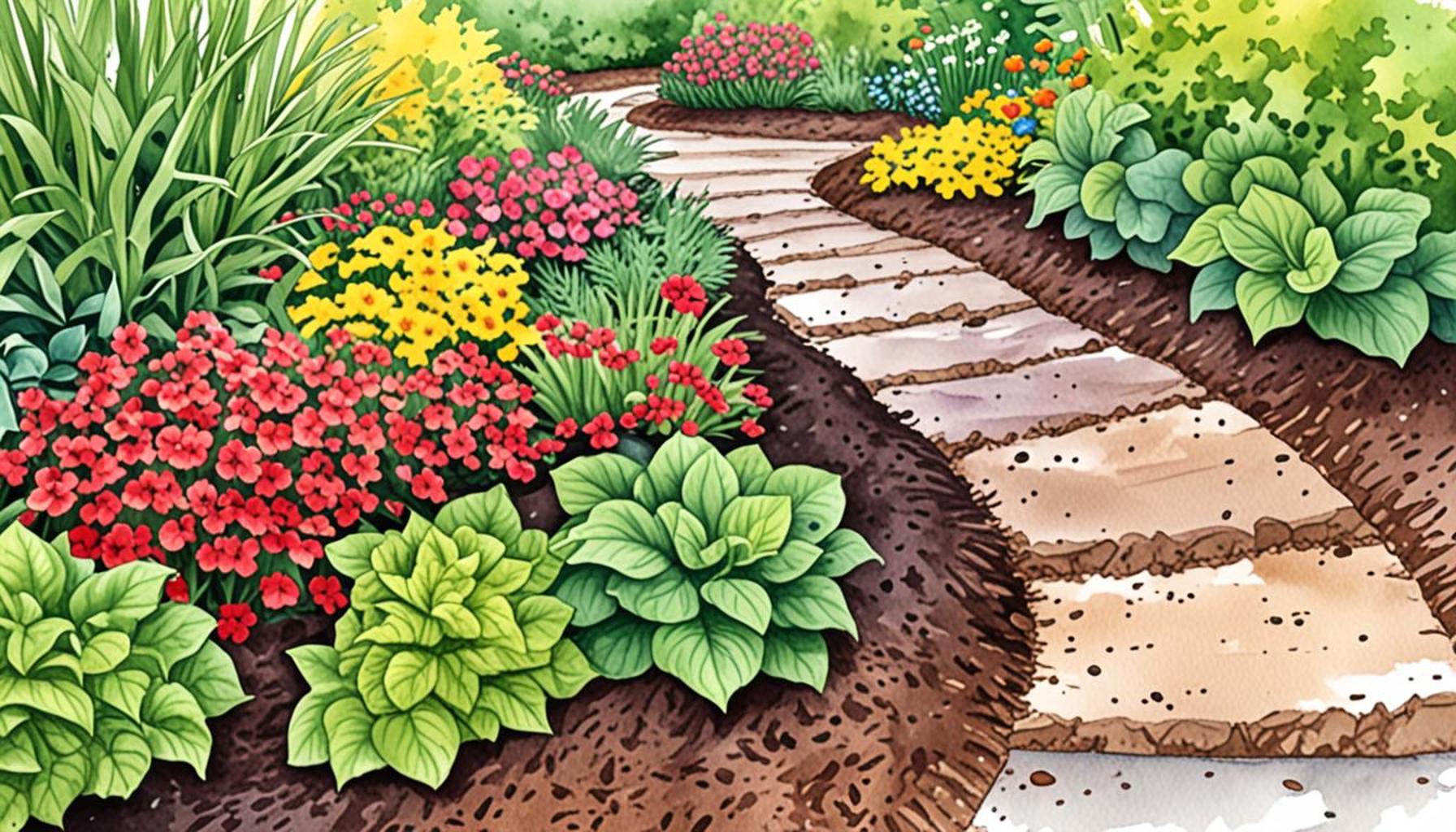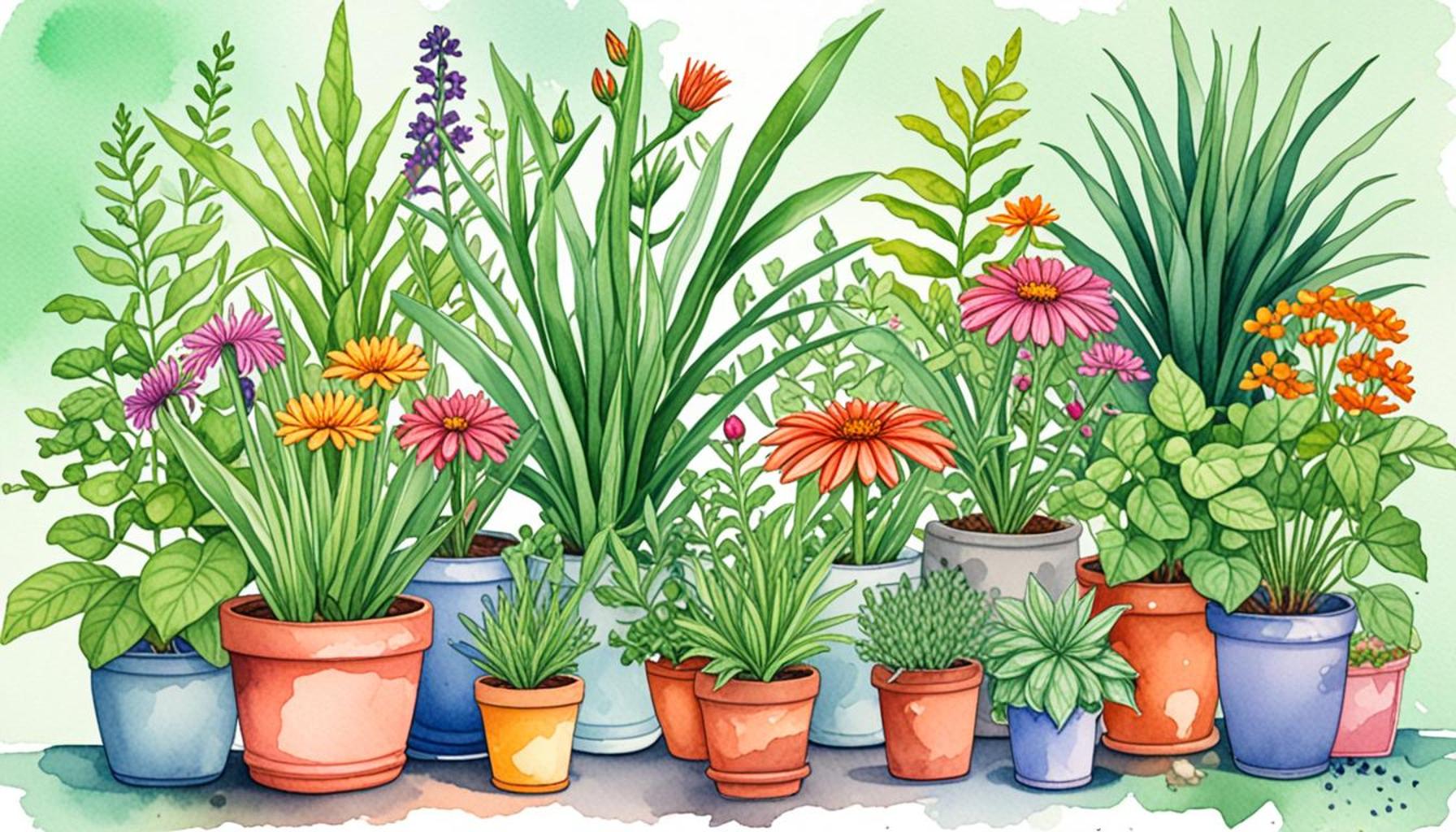Using Organic Mulches to Deter Pests in Home Gardens

Understanding the Importance of Organic Mulches in Pest Control
For many home gardening enthusiasts, the quest for a pest-free paradise is often fraught with challenges. The reliance on chemical pesticides, while effective in the short term, comes with significant drawbacks. These chemicals can harm beneficial insects, contaminate soil, and even pose health risks to humans and pets. In contrast, organic mulches present an innovative, eco-friendly solution that promotes both pest control and soil health.
The Multifaceted Benefits of Organic Mulches
Integrating organic mulches into your garden doesn’t merely serve as a barrier against pests; it also offers a cornucopia of advantages:
- Weed suppression: By blocking sunlight, organic mulches form a physical barrier that hinders the germination and growth of unwanted weeds. This is especially useful during the spring and summer months when weeds tend to proliferate.
- Moisture retention: Organic mulches significantly minimize evaporation, helping maintain optimal soil moisture levels. This can be particularly beneficial in regions of the United States that experience higher temperatures or lower rainfall during certain seasons.
- Soil improvement: As organic materials decompose, they enrich the soil with vital nutrients such as nitrogen, phosphorus, and potassium, essential for plant growth. This not only boosts the health of your plants but fosters a more sustainable gardening ecosystem.
Types of Organic Mulches for Pest Control
Not all organic mulches are created equal when it comes to pest management. Here are some that have proven effective:
- Bark chips: This popular mulch option is not just visually appealing; it is also excellent for deterring pests such as slugs and snails, which can wreak havoc on your prized vegetables and flowers.
- Straw: An old favorite among gardeners, straw excels at retaining soil moisture and provides a habitat for beneficial insects. Its fibrous nature creates a barrier against certain insects while serving as an organic matter that enriches the soil.
- Grass clippings: Easily sourced from your own lawn care routine, grass clippings are not only a rich source of nitrogen, promoting healthy plant growth, but they also act as a deterrent for some common garden pests.
The Ecosystem Transformation
Adopting organic mulches as a pest management strategy can be transformative for your garden. Not only do they offer a safer alternative to chemical treatments, but they also encourage biodiversity. This approach helps to create a balanced ecosystem where beneficial insects can thrive, ultimately leading to natural pest control.
As you consider your options for pest management, think about how organic mulches can serve as your first line of defense. With numerous varieties available, you can select the best one tailored to your garden’s unique challenges, ensuring a healthier and more vibrant environment for your plants.
In conclusion, as home gardening gains popularity across the United States, integrating organic practices like mulching will not only benefit individual gardens but contribute to a more sustainable future for agriculture as a whole. By exploring these practices further, you can be part of a movement dedicated to preserving the environment while still achieving a lush, green garden.
DISCOVER MORE: Click here to learn about common pests
Effective Strategies and Varieties of Organic Mulches for Pest Prevention
When it comes to using organic mulches to deter pests in home gardens, understanding the distinct characteristics of various mulch types can empower gardeners to make informed choices. These options serve not just as a layer of protection but also as a strategic component of a multifaceted approach to garden health. By selecting the right organic mulch, homeowners can create an environment that is less hospitable to unwanted pests.
This Season’s Best Organic Mulch Choices
As gardeners explore their options for organic mulches, several noteworthy types stand out due to their pest-repelling abilities and additional benefits:
- Cedar Mulch: Known for its natural insect-repelling properties, cedar mulch is renowned for keeping away moths, termites, and even certain garden beetles. Its aromatic oils not only deter pests but also add a pleasant scent to garden areas, making it an aesthetically pleasing choice.
- Pine Needles: Another excellent option, pine needles create a long-lasting mulch that is useful in acid-loving plant beds, such as those containing azaleas or blueberries. Their sharp texture can deter slugs and certain crawling insects from reaching your prized plants.
- Compost: Using finished compost as a mulch not only suppresses weeds and retains moisture but also adds nutrients back into the soil. Well-cooked compost has a lower likelihood of harboring pests compared to raw organic materials, making it a safer choice for budding gardeners.
Timing and Technique: Maximizing Mulch Efficiency
The timing of mulch application plays a crucial role in its effectiveness. Applying organic mulch at the right moment can significantly enhance its pest-deterring properties:
- Preemptive Layering: Consider mulching before planting to create a protective barrier against pests that might otherwise invade newly established plants.
- Proper Thickness: A mulch layer of about 2-3 inches is generally optimal to promote moisture retention and prevent weed growth without providing a cozy haven for pests.
- Regular Maintenance: It’s vital to replenish organic mulches as they decompose. Regular checks not only enhance the mulch’s efficacy but also allow gardeners to identify and address potential pest issues before they escalate.
Incorporating organic mulches into your gardening routine isn’t just about aesthetics or soil conditions; it’s about creating a living environment where plants can thrive while discouraging undesirable visitors. By analyzing the specific agricultural challenges of your region and the unique characteristics of different mulch types, you can build a tailored approach to garden health that harmonizes with nature. In particular, regions experiencing increasing pest pressures due to climate change may find that organic mulches serve as a proactive measure to safeguard their gardens.
As you delve deeper into the world of organic gardening, remember that an informed choice of mulch can significantly influence not just your garden’s health, but also its overall biodiversity. Investigate further into which organic mulches might best suit your garden’s needs and watch as these eco-friendly options transform your space into a thriving ecosystem.
Exploring the Benefits of Organic Mulches
Organic mulches, such as wood chips, straw, and grass clippings, offer more than just aesthetic appeal in home gardens; they serve as a natural barrier against pests and enhance overall soil health. By incorporating these materials into your garden, you engage with various ecological benefits that contribute to a thriving garden environment.One of the prime advantages of organic mulches is their ability to suppress weed growth. Weeds compete with your plants for resources, and their presence can lead to increased pest infestations. Organic mulches block sunlight, making it more challenging for weeds to establish themselves. As these mulches decompose, they also enrich the soil, creating a nurturing habitat for beneficial microorganisms.Moreover, many pests are deterred by the physical barrier created by organic mulches. For instance, a layer of straw can prevent soft-bodied pests like slugs and snails from reaching your plants. Additionally, some organic mulches have natural pesticide properties. For example, cedar wood chips are known to repel certain insects due to the oils within the wood. It’s also crucial to consider the long-term impact of organic mulching. Unlike synthetic options, organic mulches improve soil structure, enhance moisture retention, and promote nutrient cycling. As earthworms and other soil creatures thrive in a healthy mulch layer, your garden soil becomes increasingly fertile, promoting plant health and resilience against pest threats.To maximize the benefits of using organic mulches, it’s beneficial to evaluate your specific garden needs. The choice of mulch could depend on your plants’ requirements, your local pest profiles, and regional climatic conditions. By being informed and selective, you can create a more effective pest deterrent strategy that supports your garden’s ecosystem.Incorporating organic mulches into your gardening practices not only deters pests but also fosters an environment where beneficial insects can thrive. Establishing a healthy balance in your garden ecosystem is key to long-term success.
| Category | Details |
|---|---|
| Pest Deterrence | Physical barrier against pests, such as slugs and beetles. |
| Soil Health | Improves soil structure and enhances moisture retention. |
Conclusively, employing organic mulches serves as a sustainable, beneficial approach to pest management in home gardens, encouraging both plant health and environmental stewardship.
DISCOVER: Click here to learn how to simplify your plant care
Utilizing Organic Mulches for Enhanced Pest Management
While the selection of organic mulches is essential in deterring pests, understanding how to integrate these materials into your gardening practices further enhances their benefits. Employing strategic combinations and implementing companion planting can create a robust defense against invasive garden pests.
The Art of Companion Planting
Companion planting involves placing specific plants in proximity to one another to enhance growth and repel pests. By complementing your organic mulch strategy with this technique, you can develop a natural pest deterrent system in your garden. Here are a few effective pairings:
- Marigolds: Known for their vibrant flowers and pest-repelling abilities, marigolds can deter nematodes and aphids when planted alongside vegetables like tomatoes, peppers, and cucumbers. Covering the soil with organic mulch like straw or shredded leaves boosts the effectiveness of this strategy by providing a refuge for beneficial insects and moisture retention for the plants.
- Basil and Tomatoes: Basil not only enhances the flavor of tomatoes but also helps repel pests such as mosquitoes and flies. Utilizing a layer of organic mulch, such as compost or grass clippings around these plants, can create an ideal garden environment, safeguarding them from pests while enriching the soil.
- Garlic and Roses: Garlic is renowned for its ability to fend off various garden pests. When paired with roses, the pungent smell helps keep aphids and thrips at bay. To maximize this combination, a thick layer of organic mulch can help retain moisture around the rose bushes, promoting healthier blooming while thwarting pest infestations.
Mulch Temporary Barriers: Preventing Pest Invasion
In addition to companion planting, gardeners can use organic mulches as temporary barriers against invading pests. The physical structure and texture of mulches can create obstacles for unwanted species:
- Wood Chips: Utilizing larger-sized wood chips not only adds aesthetic appeal but also acts as a deterrent to crawling insects and rodents thanks to their coarse texture. These organic mulches can also provide a habitat for beneficial microorganisms, enhancing soil health.
- Cardboard or Newspaper: In the process of creating no-dig gardens, using layers of cardboard or newspaper beneath organic mulch blocks weeds and prevents pests from tunneling into the soil. This approach is especially beneficial for newly established gardens where root systems need time to establish themselves.
- Grass Clippings: In addition to being a nitrogen-rich organic mulch, fresh grass clippings can smother weeds and deter certain pests. However, allow them to dry out slightly before applying; otherwise, they may form a dense mat that could attract pests instead.
Moreover, organic mulches can attract beneficial insects, such as ladybugs and lacewings, which prey on common garden pests. Creating a welcoming environment for these beneficial species can greatly enhance pest control measures in gardens across the United States.
The dynamic interplay between organic mulches and these complementary techniques highlights a holistic approach to garden health. By crafting a multi-layered strategy inclusive of pest-repellent plants and diverse mulch types, you are well on your way to building a thriving ecosystem in your backyard. This comprehensive view of organic mulches extends beyond simple aesthetic considerations, paving the way for a resilient and bountiful garden, all while contributing to the broader goal of sustainable gardening practices.
DISCOVER MORE: Click here to learn about annual vs perennial flowers
Conclusion: Embracing Organic Mulches for a Healthy Garden Ecosystem
In summary, the utilization of organic mulches goes far beyond mere aesthetics in home gardens; it plays a crucial role in effective pest management. By selecting appropriate mulching materials and integrating them with techniques like companion planting, gardeners can create a thriving ecosystem that naturally wards off undesirable pests. Marigolds, basil, and garlic are just a few examples of robust companions that enhance growth while providing protection against common invaders.
Furthermore, implementing organic mulches as temporary barriers can physically obstruct pests, promoting a healthier and more productive garden. The diverse textures and materials—from wood chips to grass clippings—serve not only to prevent pest invasions but also to enrich the soil and support beneficial organisms that contribute to a balanced garden environment.
As more gardeners across the United States seek sustainable practices, embracing organic mulches stands out as an accessible and effective solution. This holistic approach adds layers of protection while promoting biodiversity. With every layer of mulch, you are not just protecting your plants but also participating in a broader movement towards eco-friendly gardening. As you cultivate your garden, remember that each choice you make can harmonize with nature, leading to resilient plants and a bountiful harvest.
In conclusion, the journey to deterring pests through organic mulches is an enriching experience that fosters creativity and contributes to the sustainability of your gardening practices. Engage with these techniques, explore various materials, and watch as your garden flourishes, free from the grips of lurking pests.


